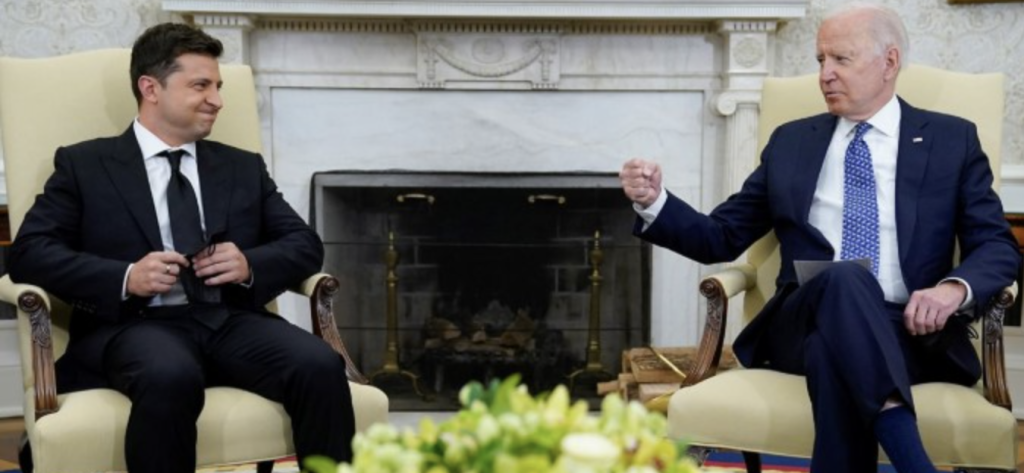
Image: LN24INT’
U.S. President Joe Biden has authorized the use of anti-personnel mines by Ukraine as part of its ongoing defense efforts against Russian forces, marking a significant shift in U.S. policy. The decision has sparked debate, with critics raising concerns about the humanitarian impact of such weapons.
In a move that has drawn both praise and criticism, U.S. President Joe Biden has approved the delivery of anti-personnel mines to Ukraine to aid in its defense against Russia’s invasion. A U.S. official confirmed the decision on Wednesday, stating that the Biden administration believes these weapons will be crucial in strengthening Ukraine’s ability to protect its territory from Russian advances.
The decision to approve the use of landmines, which are banned under the 1997 Ottawa Treaty by most countries including the U.S., represents a reversal of previous policy. The United States had previously refrained from providing anti-personnel mines to Ukraine due to concerns about their long-term humanitarian impact and the risks of civilian casualties.
Rationale Behind the Decision:
According to the U.S. official, the mines are being approved to help Ukraine defend against Russia’s ongoing military aggression, particularly in the face of entrenched Russian forces and supply lines. The mines are seen as a defensive measure aimed at deterring Russian troops from advancing in certain areas, especially in regions where Ukraine is mounting counteroffensives or where Russian forces have entrenched positions.
“Anti-personnel mines can be an effective tool for defending territory, particularly where the threat of Russian incursions remains high,” the official said. “This decision is part of the broader support we’re providing to Ukraine to help them defend their sovereignty and push back against Russian forces.”
The approval comes as Ukraine continues to face mounting challenges in its fight against Russian forces, with both sides engaged in intense fighting over strategic areas, including in the eastern and southern regions of Ukraine.
Humanitarian Concerns:
The decision to approve anti-personnel mines has raised alarm among humanitarian groups, which argue that the use of such weapons will exacerbate the risks to civilians, particularly after the conflict ends. Anti-personnel mines are notorious for causing long-lasting dangers, as they can remain active for years, maiming or killing civilians long after active fighting has ceased.
Human Rights Watch (HRW) and the International Committee of the Red Cross (ICRC) have both expressed concern over the potential humanitarian fallout from the approval of these weapons. HRW’s senior arms researcher, Steve Goose, stated, “The use of anti-personnel mines will have serious consequences for civilians and will make it harder to achieve lasting peace in Ukraine. These weapons violate international humanitarian law and pose long-term risks to civilians long after the fighting is over.”
The U.S. had previously been a signatory to the Ottawa Treaty banning the use of anti-personnel mines but withdrew from the treaty in 2004 under President George W. Bush. The decision to approve the mines for Ukraine has reignited debate over the ethical implications of using such weapons, particularly in the context of an ongoing war that has already displaced millions and caused widespread destruction.
International Reactions:
The move has also elicited varied reactions from the international community. NATO allies, who have been unified in their support for Ukraine, have yet to officially comment, though some European leaders have expressed concerns about the broader implications for global norms on the use of landmines.
Russian officials have criticized the decision, calling it “provocative” and accusing the U.S. of further escalating the conflict by providing weapons that could lead to greater harm. Moscow’s Ministry of Foreign Affairs issued a statement claiming that the U.S. approval of anti-personnel mines violates international agreements and could “lead to increased suffering for civilians in Ukraine.”
On the other hand, some military analysts argue that the use of anti-personnel mines could help Ukraine secure key regions and slow down Russian advances, particularly as Russia’s military continues to dig in across contested areas. Analysts note that these weapons are typically used to create defensive perimeters and are not intended for offensive operations.
Conclusion:
President Biden’s approval of anti-personnel mines for Ukraine is a contentious move, with significant implications for both the ongoing conflict and the broader international community. While the decision is framed as part of the U.S.’s commitment to supporting Ukraine’s sovereignty and defense, it raises serious ethical questions about the long-term humanitarian costs of such weapons. As the war in Ukraine continues, the balance between military necessity and humanitarian concerns will remain a key point of debate in U.S. foreign policy.
Get the latest of our Loveworld News from our Johannesburg Stations and News Station South Africa,LN24SA
Related Posts
Some description text for this item
